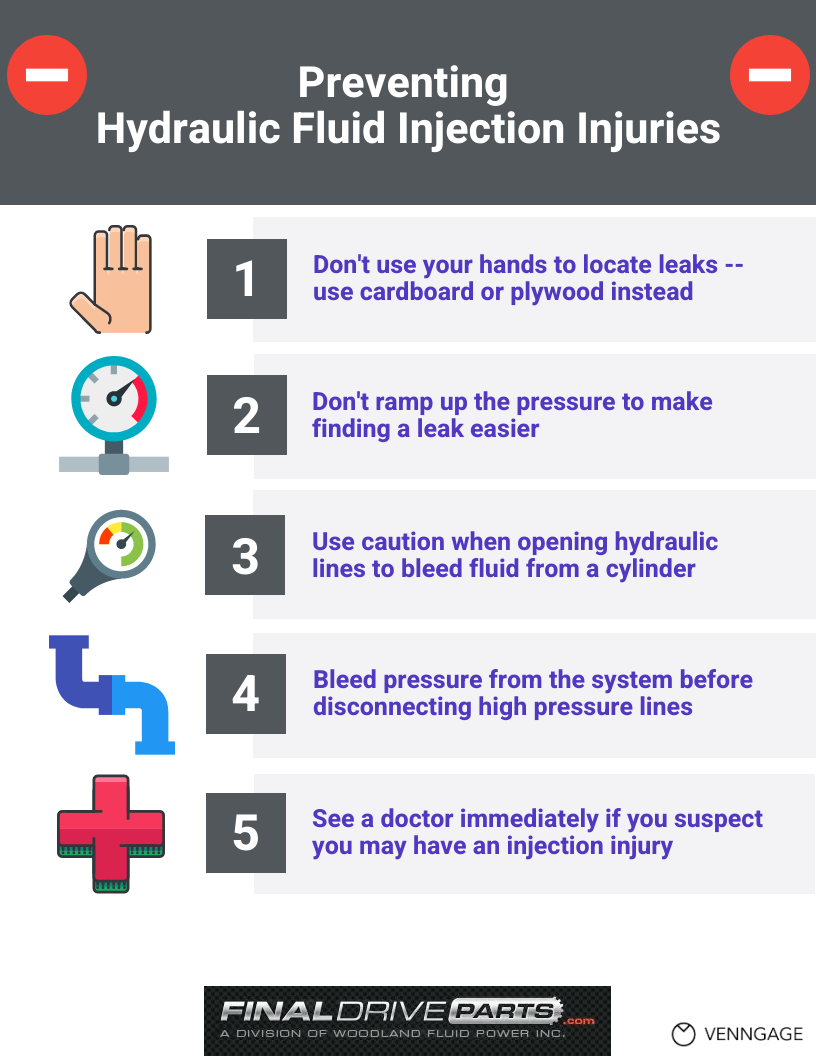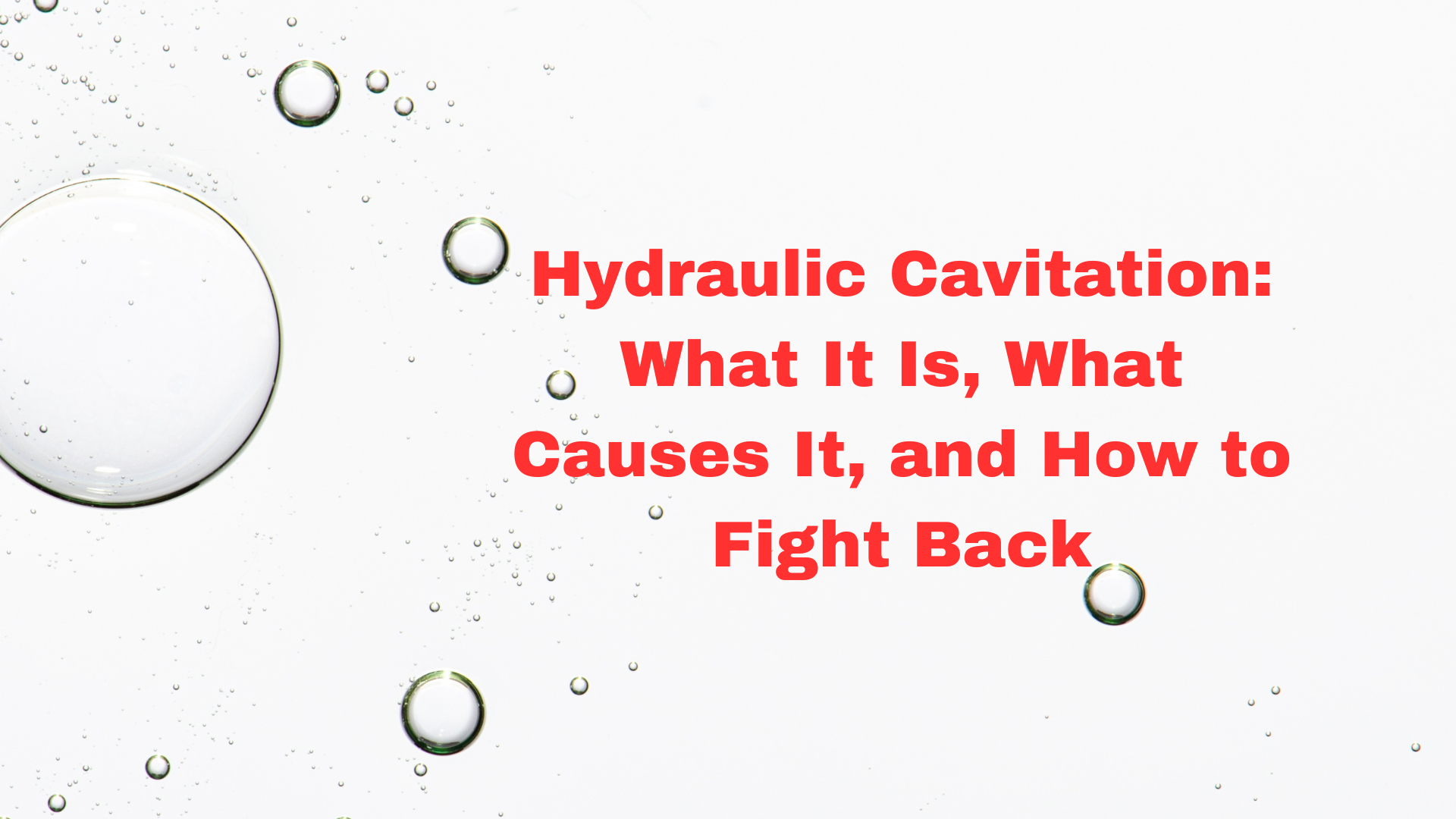Basic Facts about Hydraulic Fluid Injection [Infographic]
Posted by Dr. Sara McCaslin on Nov 13th 2020
Hydraulic fluid injection is very dangerous -- know the facts before you take the risk.

Here are a few other Shop Talk Blog posts you might be interested in ...
- Help! I've Sprung a Leak in My Final Drive
- Reviewing Hydraulic Connections on a Final Drive
- The Basics of Final Drive Motor Seals
When Hydraulic Fluid Becomes Dangerous
Hydraulic fluid seems fairly harmless to work with, as long as you don't do anything foolish like try to drink it. However, problems arise when hydraulic fluid is pressurized. Contact with pressurized hydraulic fluid can lead to a serious type of injury known as hydraulic fluid injection. In fact, let's make this clear right now: jf you're working with pressurized hydraulic fluid and feel a prick (like electricity) on your skin, please seek medical attention right away.
Common Issues with Hydraulic Fluid
We know that hydraulic fluid isn't completely harmless: you don't want to drink it and you sure don't want to get it in your eyes. Some people have a skin reaction when they come into contact with certain types of hydraulic fluid. In general, the type of hydraulic fluid that is used in compact equipment isn't dangerous for the vast majority of people until it's pressurized.
What is Hydraulic Fluid Injection?
Hydraulic fluid injection occurs when a stream of hydraulic fluid, under as little as 100 psi, penetrates your skin. It can occur with other fluids, such as water, diesel, or paint, but the issue is the same: a fluid at high pressure pierces your skin and become trapped underneath. The first recorded case of this type of high pressure injury occurred back in 1925, so it isn't anything new.
When fluid initially hits your skin, it usually feels like a bee string, a wire prick, or a slight shock of electricity. The entry site may be so tiny that it looks like a pin prick, but don't let the size of the injury deceive you: it can still be very dangerous. It can also look like a cut or tear in your skin.
Within a few hours, you'll notice some welling and redness, usually accompanied by pain. After six hours, it will usually either be throbbing or feel numb. If left untreated, the tissue in the area of the injury will begin to die, you may experience a serious physical complication called compartment syndrome, and death can even occur. If the injury isn't treated soon enough, you may end up with an amputation.

How Do I Prevent Hydraulic Fluid Injection?
Here are some basic guideline for preventing hydraulic fluid injection:
- Never use your hands to locate a leak -- use cardboard or plywood
- Don't ramp up the pressure to make it easier to find a leak
- Use caution when opening hydraulic lines to bleed fluid from a cylinder
- Bleed pressure from the system before disconnecting high pressure lines
What Should I Do If I Think I've Been Injected?
Remember that injection injuries don't always exhibit symptoms right away, so just because you don't feel anything other than a simple prick doesn't mean it's safe to ignore. If you believe you have into contact with pressurized hydraulic fluid, you need to see a doctor ASAP. Even if the injury isn't serious, there are chemicals in hydraulic fluid that can be toxic. And don't be surprised if surgery is necessary to save as much healthy tissue as possible. Hydraulic injection injuries are no joke.
Conclusion
Hydraulic injection injuries, though they may not even seem painful at first, are not to be ignored. Be careful when working around pressurized hydraulic fluid, don't look for leaks using your hands, and bleed the pressure before disconnecting high pressure lines.

![Basic Facts about Hydraulic Fluid Injection [Infographic]](https://cdn11.bigcommerce.com/s-lbnln0ppxx/images/stencil/original/uploaded_images/basic-facts-about-hydraulic-fluid-injection-.png?t=1605320817)





